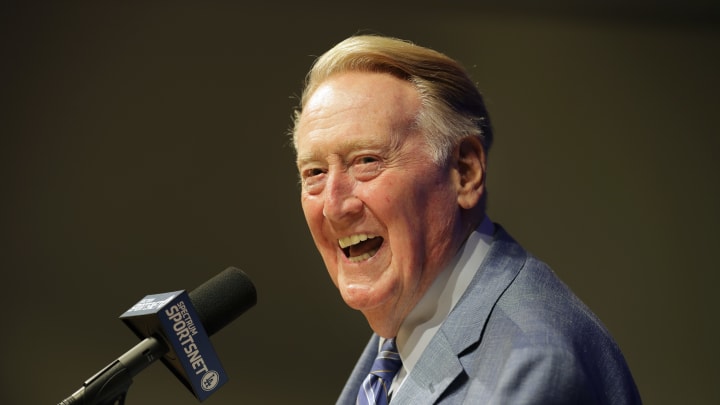Vin Scully reflects on 67 years of baseball memories

LOS ANGELES (AP) The three-ring binder chock full of tidbits Vin Scully wants to talk about on the air will soon be flipped shut for the last time.
After Saturday night, the Hall of Fame broadcaster is down to calling four Los Angeles Dodgers games before concluding his 67-year career on Oct. 2 in San Francisco.
''I'm trying very hard not to think about me,'' he said Saturday during a 50-minute session with the media. ''I want to think about the game and the importance of the game.''
The game has always been the thing for Scully, starting in 1950 when he joined Red Barber and Connie Desmond in the Brooklyn Dodgers radio and television booth. Barber was the father figure, Desmond was the big brother and Scully was the 22-year-old kid.
Early on, Scully declared on the air that Willie Mays was the best player he'd ever seen.
An irritated Barber pulled him aside afterward, lecturing, ''You haven't been around long enough to talk about the best player you've ever seen.''
''Connie would put his arm around me,'' Scully recalled, ''and say, `It's OK, kid. Let's go get a beer.'''
Scully's broadcasts focus on stories involving the people on the field rather than baseball statistics. He admits having ''no idea'' about newer stats like WAR (wins above replacement) or OPS (on base plus slugging percentages).
''I'm not smart enough to keep all those numbers in my head,'' he said. ''I got to know the players. I started to treat them like human beings. I would be by the batting cage. A player might come over and say, `You know what happened to the shortstop yesterday?' and I would have a story.''
As the longest tenured broadcaster with a single team in any professional sport, Scully has plenty of stories and an amazing recall of names, dates and occasions that would put most 88-year-olds to shame.
He's used his encyclopedic knowledge working games alone for much of his career, making him an anomaly in today's world of booths jammed with play-by-play, color commentators and analysts talking over each other.
''That's not an ego trip on my part,'' Scully said. ''Red had the theory: one voice, one man. The one-on-one is really effective.''
Scully's esteem and influence earned him an offer from Eugene Wyman to run for office in 1964. Wyman's wife, Roz, was influential in helping bring the Dodgers west in 1958. Wyman told Scully the Democrats were looking for a candidate to fill the U.S. Senate seat from California. Scully listened politely and asked Wyman for 48 hours to mull it over.
''I called him and said, `I've given it a lot of thought, which was not true, I just don't think I'm qualified and I think I'd be happier doing my baseball games,''' Scully said.
His first Brooklyn Dodgers game on April 18, 1950, was in Philadelphia, having cracked jokes on the way to the ballpark in the back of the bus with Jackie Robinson, Gil Hodges, Duke Snider, Pee Wee Reese, Roy Campanella and Don Newcombe, whose friendship with Scully extends to this day.
''They didn't trust me more than one inning,'' Scully said, recalling Barber assigned him to call the fourth. ''I was terrified.''
Even today, he says, ''There's a sense of complete relief when it's over with.''
Eventually, Scully grew as comfortable behind the mic as Dodgers fans did listening to his dulcet voice that has informed and educated generations of Angelenos.
''I'm a very happy person. I love people,'' he said. ''When I go on the air, I'm happy. The people, that's what I will miss. The people have made me feel so much at home and I think I've carried that onto the air.''
The fans paid him back with multiple ovations Friday night during an emotional pre-game ceremony on his appreciation night.
''I started to cry at the beginning,'' he said. ''I've never heard the noise that we heard. It kept building and staying there. There was love coming out of those stands.
''You've heard about being on Mount Olympus. I think I was 5 feet above that.''
When Scully awakes in his own bed on Oct. 3, he'll be unemployed for the first time since 1950.
''Maybe the first thing I'll do is take my watch off and put it in the drawer and just think I can do anything I want,'' he said. ''I'll have breakfast, read the papers, go for a walk and get a book.''
''It won't be painful at all,'' he said, assuredly.
Not for him, but for the rest of us.
